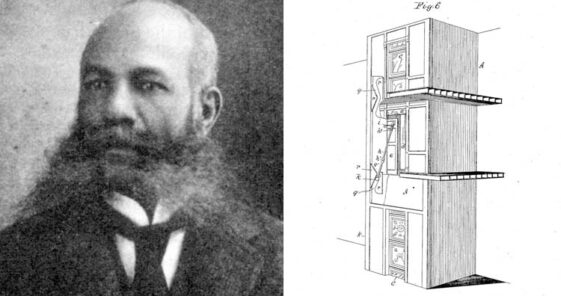Did Alexander Miles Invent the Elevator Brake?
Discovering the True Inventor of Elevator Brake: Alexander Miles

Source unbelievable-facts.com
Alexander Miles Invented: Elevator Safety Devices
Alexander Miles, born in 1838, was a prolific African-American inventor and businessman from Duluth, Minnesota. He was one of the few African-American inventors to receive a patent in the 19th century. Miles was a successful entrepreneur who owned several businesses, including a barbershop, real estate, and even a creamery at one point. However, it was his invention of the elevator safety devices that brought him fame and recognition.
The Life of Alexander Miles
Alexander Miles was born in Ohio and spent most of his early life in Wisconsin. Not much is known about his early education, but it is believed that he was self-taught and had a keen interest in mechanics. In 1874, Miles moved to Duluth, Minnesota, where he became a successful businessman. He owned several properties in Duluth, including a 31-room hotel, and was a prominent member of the black community.
The Need for Elevator Safety Devices
Early elevators were dangerous and not very reliable. They had no automatic control system and were operated manually. Passengers often had to open and close doors manually and could fall if they lost their balance. The most significant risk factor was the malfunctioning of the hoisting system. In the case of a hoisting cable breaking, passengers would be plunged to their deaths.
These dimly lit, slow-moving, unreliable machines cost many lives. Elevator accidents were frequent, and people were wary of them. Safety concerns hampered the growth of the industry as potential customers avoided elevators out of fear of being injured or killed.
The Invention of the Elevator Safety Devices
On October 11, 1867, Alexander Miles invented an elevator safety device that made use of a spring-powered automatic door system. The elevator door would automatically open and close, preventing people from accidentally falling down the elevator shaft. Furthermore, Miles' invention included an innovative braking system that used chains to hold the lift in place in case the elevator cable broke.
Miles received US Patent #371,207 for his invention on October 11, 1887, almost exactly ten years to the day after his invention. He became an instant celebrity in the elevator business and beyond. His invention revolutionized the industry and made elevators safe and reliable. In fact, this safety device became a requirement for all elevators in the United States, helping to make them staples in American architecture.
In conclusion, Alexander Miles was a brilliant inventor, businessman, and entrepreneur who contributed significantly to the safety and efficiency of the elevator industry, making him an inspiration to many. His invention has become a permanent fixture in modern-day elevators, and his legacy continues to inspire new generations of innovators.
Impact of Alexander Miles's Invention
Safety in Elevator Travel
Before Alexander Miles invented his elevator safety devices, getting on an elevator was extremely risky. Elevators posed a huge danger to passengers, particularly when they were first designed. It was not uncommon for elevators to suddenly plummet, causing severe injuries and even death. After the invention of Miles's safety mechanisms, such accidents reduced significantly.
Miles's invention involved two critical safety features. The first was an automatically closing door that prevented passengers from accidentally falling down the elevator shaft. This feature allowed people to step into an elevator safely without worrying about the risk of falling. The second safety feature was the emergency brake. If the elevator cables broke, the emergency brake engaged to reduce the risk of a free fall. These two features, combined, made elevator travel much safer.
Miles's invention had a huge impact on the public's perception of elevators. People began to trust elevators, and commercial building owners were more willing to invest in them. Elevators became a symbol of progress, luxury, and convenience, leading to increased demand for high-rise buildings and the development of modern urban environments.
Revolutionizing the Elevator Industry
Miles's invention was a game-changer in the elevator industry. Before his invention, elevators were not widely used, and the buildings that did include them were small, with only a few floors. Thanks to his invention, high-rise buildings became possible. Miles's elevator technology enabled architects and builders to reach new heights and add more floors to their buildings. As a result, cities grew vertically, and urbanization became a reality.
The elevator industry experienced significant growth in demand after Miles's invention. Manufacturing companies began to pay more attention to elevator safety and design. The competition among elevator companies led to a constant effort to improve and innovate the design of elevators. The elevator industry continued to grow and became an essential part of modern infrastructure, creating many job opportunities for people in manufacturing, construction, and maintenance of elevators.
Inspiration for Future Inventors
Miles's invention was not only transformative but inspirational. His invention paved the way for future inventors to explore new possibilities in elevator design and safety. His safety mechanisms influenced future technology that made elevators even safer, including over-speed governors and door interlocks. Furthermore, Miles's invention proved that engineering and innovation have immense value for society.
Many inventors and engineers have been inspired by Alexander Miles's elevator safety devices. His invention highlighted the impact that innovation could have on industries and daily life. Miles paved the way for newer, safer, and more efficient elevators that can move people and goods more quickly and effectively. As we move forward, Miles's invention will continue to impact the world, reminding us of the importance of safety, innovation, and progress.
Post a Comment for "Did Alexander Miles Invent the Elevator Brake?"